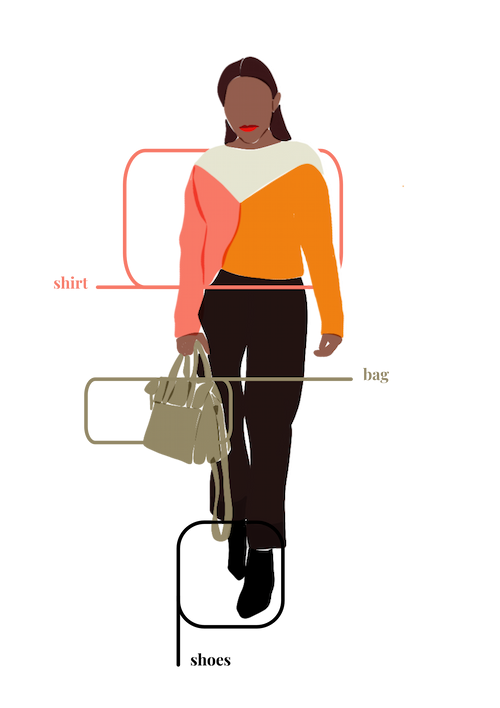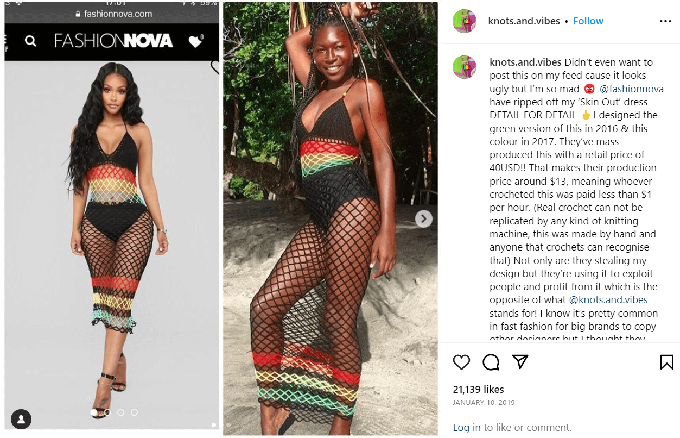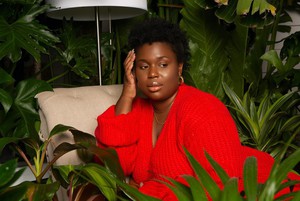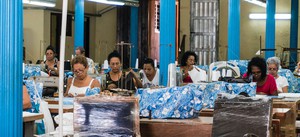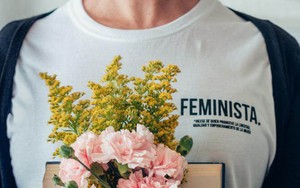- Clothes
- Bags
- Accessories
-
Inspiration
- Shoes
Racism in Fashion: Here's Why Fast Fashion Is BUILT on It
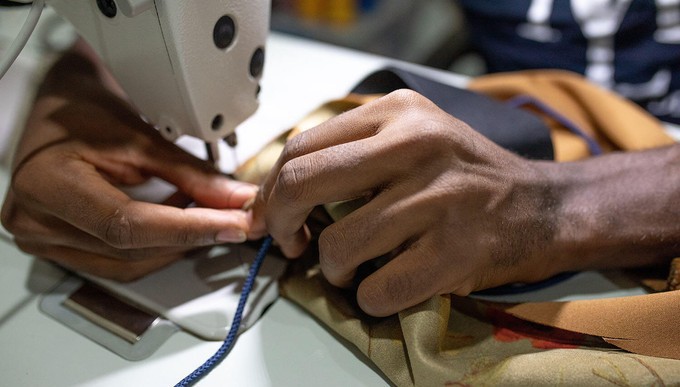
#BlackLivesMatter t-shirts made by underpaid POCs. Brands taking a stance against discrimination on Instagram… while keeping black and brown people trapped in modern slavery conditions.
Once you look behind the mask of performative marketing and token representation, you’ll see that racism in fashion is actually a deeply rooted problem.
In fact, we’d argue that fast fashion doesn’t just sustain systemic racism: it was built and depends on it.
Understanding racism in fashion: why fast fashion is built on systemic racism—even when those brands use POC models
Now, don’t get us wrong: representation is important. But many consumers are tricked into thinking that a brand is actively anti-racist just because they posted a couple of photos of a black or Asian model.
The truth?
Fast fashion’s very business model is based on cutting labour and production costs (keeping millions of POC garment workers poor) to maximise profits (and enrich mostly-white CEOs).
Here are some of the main ways in which we believe fast fashion and racism are linked.
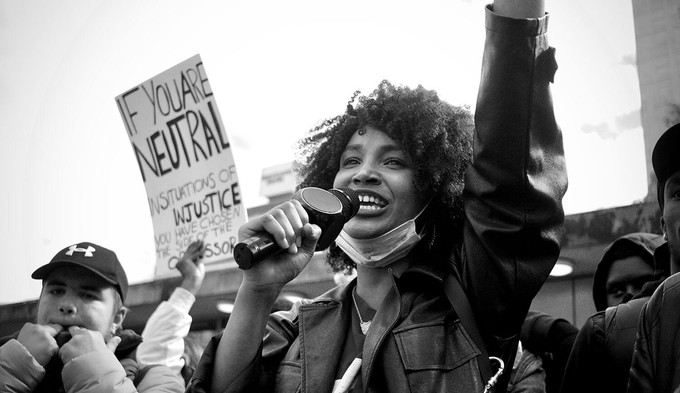
Colonialism and slavery
We tend to think of imperialism and colonialism as problems of the past. In reality, many countries are still suffering their consequences today, like political and economic imbalances.
Colonial mentalities haven’t gone away either: they are still affecting the way certain businesses operate in present times. No wonder fast fashion is based on the Global North exploiting the Global South!
Most fast fashion supply chains even share the same trade routes that were popular during European colonial exploitation.
Which takes us to the next point on racism in fashion…
Exploiting workers in developing countries
The problem isn’t that these brands employ garment workers in developing countries: it’s that they exploit them.
And to highlight the link between fast fashion and racism, out of the 74 million textile workers worldwide, 80% are women of colour.
Most fast fashion brands hide behind a shady supply chain:
- They place clothing orders at ridiculously low rates, which make it impossible to produce them sustainably and ethically. So, to meet those demands and avoid losing orders from big brands, their suppliers often subcontract to factories where workers don’t receive living wages
- These garment workers are often mistreated and abused, too
- They aren’t usually guaranteed a safe working environment, from the actual factories to being exposed to toxic chemicals and dyes (no, things haven’t improved that much since the Rana Plaza collapse that killed over a thousand workers in Bangladesh)
Environmental racism in fashion
Because fast fashion companies outsource their production to dodgy factories in developing countries, their environmental impact affects POCs and their communities more.
For example: contaminating water by dumping toxic dyes into rivers, which causes health issues like skin problems and higher risks of cancer. In China alone, 70% of rivers and lakes are contaminated by this toxic wastewater!
To give you an idea, here's a short clip from RiverBlue, one of the most eye-opening fast fashion documentaries in our opinion:
Environmental racism in fashion is also about how these communities are more likely to experience the effects of climate change, to which fast fashion actively contributes.
This inudstry is responsible for 2.1 billion metric tons of greenhouse-gases every year, and most of these carbon emissions happen during the production phase.... which usually takes place in developing countries.
Additional links between certain fast fashion brands and racism
As well as the main connection between the overall fast fashion industry and systemic racism, it’s important to note that certain brands sometimes make things even worse.
Fast fashion brands often steal from POC creators
These companies are regularly getting called out for copying indie designers, and they’re no strangers to cultural appropriation either.
There have been several instances of this happening with POC designers and artists, in particular. Fast fashion steals their designs or copies meaningful patterns, mass producing them and making it impossible for real POC artisans to compete.
Here’s an example of when Fashion Nova copied Luci Wilden’s work:
Performative marketing
This usually happens when a brand posts content that supports POCs or takes a stand against racism… but then they don’t actually do anything to tackle it within their own business model and supply chain.
For example, many fashion brands supported the #BlackLivesMatter movement but cancelled $40 billion worth of clothing orders at the start of the pandemic… without paying for the work that had already been completed (once again, mostly by POC garment workers):
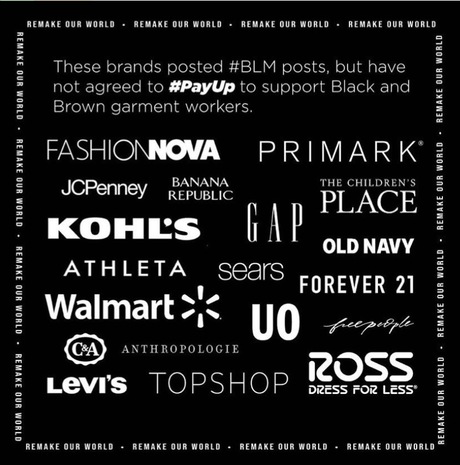
Image credit: @remakeourworld
Less representation
It’s rarer to see POC models in social media photos and marketing materials (and, to be completely objective, this applies to both fast fashion brands and ethical ones, too).
Plus, this lack of diversity is a problem that affects all levels of the fashion industry. For example, 63% of designers are white. This becomes a vicious cycle: due to both lower representation and opportunities, fewer POC pursue that type of career.
What can you do to stand against racism in fashion?
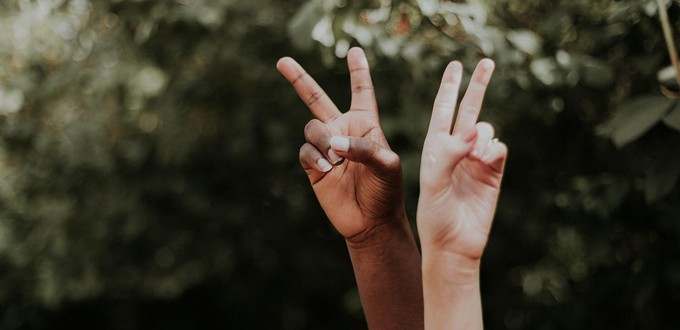
At Project Cece, we’re well aware that this isn’t something we can solve in one day. However, we believe we can all make a difference together:
- Educate yourself. Hopefully, this blog post was a good starting point! To learn more about intersectionality and the connection between fast fashion and racism, follow POC activists, influencers, and content creators like Dominique Drakeford, Aja Barber (we also recommend reading Consumed: The Need for Collective Change: Colonialism, Climate Change, and Consumerism, one of the best sustainable fashion books), and Mikaela Loach
- Don’t get fooled by performative marketing. Is a brand sharing anti-racist content or featuring POC models but being very shady about their supply chain? That’s usually a bad sign
- Support ethical brands and POC designers. Consider voting with your money by buying clothes from POC-owned businesses and indie designers, as well as companies that guarantee fair working conditions, are transparent about their supply chain, and are actually making a difference for their POC workers and their communities
Yes, we still have a long way to go to dismantle racism in fashion. But don’t let this trick you into believing you can’t make a difference (you can).
If you’ve found this helpful, start receiving our insights and tips to make even more ethical fashion choices.
Share our story
Related articles
Why Is Sustainable Fashion Not Size-Inclusive (Yet)?
For many plus-size consumers, fast fashion is a necessity! Here’s why sustainable fashion isn’t size-inclusive yet (& how to speed up the process).
Intersectionality in Fashion: ‘Eco-Friendly’ Is NOT Enough
Can a brand really be considered ethical if it only focuses on fabrics rather than humans? Here’s what intersectionality in fashion should mean.
Why Fast & Ethical Fashion Are Feminist Issues (& How You Can Help)
From feminist slogans on t-shirts made by exploited women to the vicious cycle maintained by this industry, here’s how fashion and feminism are connected.
Project Cece is a platform that collects ethical fashion from vetted brands and shops in one place. Browse ethical fashion for women and men and find items that fit your style, budget and values!
